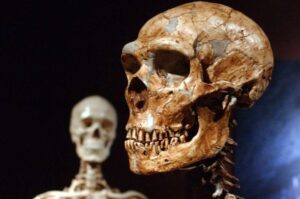Do brain size and genetics define what we are?

It could be useful to recall also how Stanford University neurologist Robert Sapolsky tells, we humans share 98.9% of our DNA with chimps. [1] The remaining 1.1% codes for olfactory receptors, some having to do with the size of the pelvic arch which allows us to walk upright, for fur and differences in the immune system. But nothing in the genome determines a cognitive difference except for genes coding for a higher number of rounds of cell division during fetal brain development, leading to trice as many neurons in the human brain as in a chimp brain. This makes it clear that the difference in cognitive abilities between humans and chimps is not stored in the DNA. The genes encode only for a quantity which, much later, enables a quality, but there is nothing in the genome that determines that quality. The latter must somehow be acquired with experience by our human neocortex, inside which reside the main cerebral differences between our brain and those of other animals.
Curiously, however, the entire neocortex seems to be connected to motor tasks. Here, cells connect with areas of the old brain related to the generation of movement. This is not what one would expect from an organ supposedly dedicated to the display of complex higher-order cognitive functions. Moreover, while one would expect, for the same reason, great diversity and variation throughout the neocortex, one finds instead that it is very similar all around. The variations between areas are small. One of the main distinctions between our neocortex and the rest of the brain are the hundreds of thousands of ‘cortical columns’–that is, a particular modular structure of columns of neurons–but its functional role remains unclear (link). Of course, from brain scans, we know that the neocortex lights up when language and semantic processing (in particular, in the Broca’s area) occur and reasoning, thought or emotional events take place. However, all these anatomical specifications and localizations don’t tell us much about how and why these particular neuronal geometries should generate such cognitive skills and phenomenal experiences. Sufficient facts lead us to doubt that these neuronal structures supposedly do this in the first place. But, setting aside the hard problem of consciousness and its neural correlates, what is nowadays certain is that nothing in our genes codes for these skills, other than saying “multiplicate chimp neurons times three”.
Unfortunately even this fact has no whatsoever explanatory power as to what makes us different from chimps. There is a common misplaced belief that bigger brains make us smarter. Size matters for manipulative complexity, such as the more complex hand movements in primates, which humans can develop superbly (think of the hands of an expert musician playing piano) (link). But a direct correlation between brain size and mental skills is not that straightforward. We like to believe that it is our brain size that makes us human but rarely do we question what one means by ‘size’. The number of neurons? The weight of the brain? Its brain-to-body mass ratio? Or its volume? Humans don’t have the largest brain size in any of the aforementioned senses. The human brain has about 90 billion neurons, weights ca. 1.1 to 1.4 kg and has a volume of 1300 cm3. But the brain of an elephant has three times the number of neurons we have, and the weight and volume of the brain of a sperm whale are six times as much and ants have six times larger brain-to-body mass ratio. A bit of an extreme example that shows how cognitive skills and brain size are decoupled is the case of ‘mouse lemurs’ that have a brain that is 1/200th the size of monkeys’ but perform equally well on a primate intelligence test (link). Therefore, brain size alone is not what makes up a more developed mind. Then what does?
How can we reconcile these facts with the belief that it is our brain that makes us what we are? To save the brain-centered (and anthropocentric) paradigm, we must find something that distinguishes us from animals, enthroning us on the top of the evolutionary hierarchy. And guess what…if you try hard and search long enough for something that confirms your bias, you will always find it. In fact, it turns out that humans are the ones who possess the largest (in nr. of neurons) cerebral cortex: about 16.3 billion neurons vs. the nine billion of a gorilla and the six billion of the chimp. And, of course, that is also entirely predetermined by our genes.
And voilà… all of our belief systems are saved. The religious anthropocentric worldview and the reductionist gene-God of modern biology as well.

To this extent, are we the only species that is “destroying” ourselves after high intelligence in the long term? Or have we seen mammals destroying their environment for convenience, seems like we are the only foolish species on the planet; ironically with supposedly high intelligence